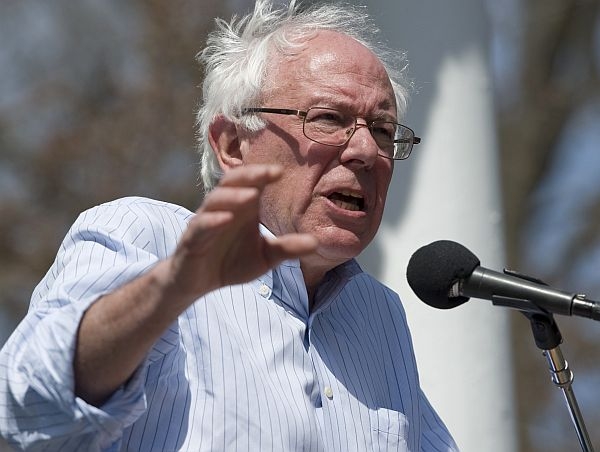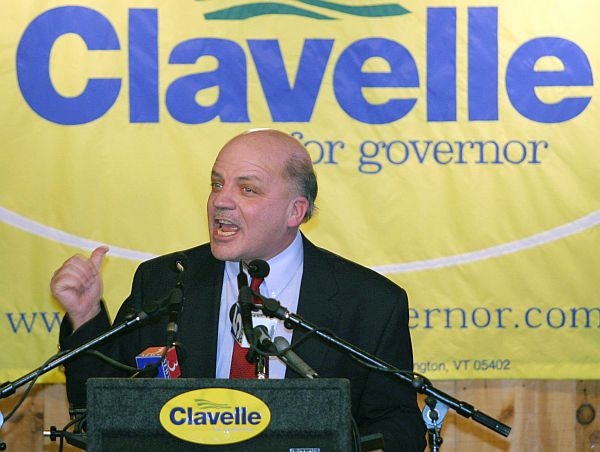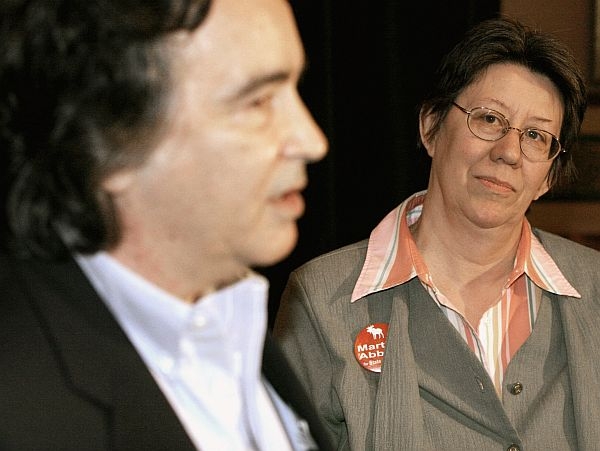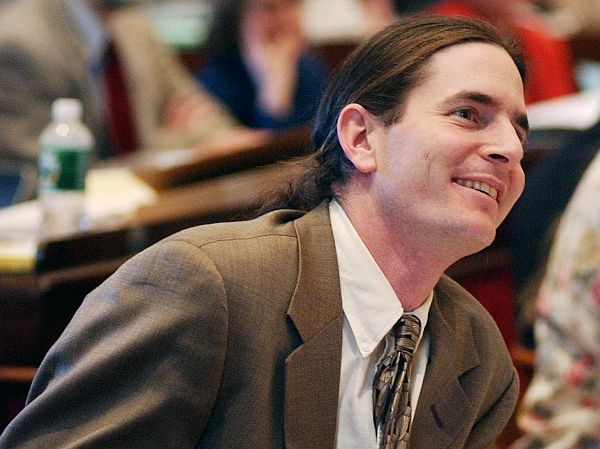
On March 4, 1981, Burlington residents awoke to a political shock. Bernie Sanders, a 39-year-old, tousle-haired radical from New York City had defeated the incumbent Democrat Gordie Paquette for mayor of the city. The margin was just 10 votes.
No one had taken Sanders seriously politically up to that point. He had run for statewide office five times in the 1970s as a member of the fringe Liberty Union and never exceeded 6 percent of the vote. And Paquette didn’t take him seriously, either. He called Bernie "Mr. Saunders," the mispronunciation a sign of his contempt.
But the Paquette administration was utterly sclerotic. An example: When the city was debating the future of the Fletcher Free Library, Paquette told a Burlington Free Press reporter he didn’t think the library was that important, that when one of his kids needed a book he bought it for them.
Long years of mismanagement gave Sanders the opening he needed. And when he was elected, Sanders began yanking the city from the 19th century into the modern era in a matter of months, establishing a deep well of political credit that lasted for nearly 30 years. The city put its banking and insurance business out to bid for the first time. Modern accounting showed that a big tax increase Paquette had been seeking wasn’t needed; the City actually had a big surplus. At the city clerk’s office, they bought a cash register for the first time, so the clerk didn’t need to rummage around in a drawer for coins when someone came in for a dog license.
 Sanders left the mayor’s office in 1989, and was succeeded by his chief lieutenant, Peter Clavelle, and sound administration continued. One of the Progressives’ major successes was blocking private development of the Burlington waterfront, now the principal jewel in the Queen City’s crown.
Sanders left the mayor’s office in 1989, and was succeeded by his chief lieutenant, Peter Clavelle, and sound administration continued. One of the Progressives’ major successes was blocking private development of the Burlington waterfront, now the principal jewel in the Queen City’s crown.
Sanders’ followers
While Sanders moved up first to Vermont’s Congressional seat and later to a U.S. Senate seat, his followers began to make their own way politically. They were mostly young, very liberal to radical politically, and, often, highly competent. And their posture was that the Democratic Party was comprised significantly of hacks who wouldn’t grapple with issues seriously. "We have to keep the Democrats’ feet to the fire," was their mantra.
Their party designation varied, partly because Sanders himself refused to have anything to do with forming a third party. Every race he has run since he ascended to the corner office in Burlington’s City Hall was as an independent.
It was also clear, however, that a major issue for people with progressive political views was how they would balance their commitment to issues against their perceived need to build a third party. Third parties in the United States often succeed mainly in electing their biggest enemies, rather than what they think of as their wishy-washy friends. They rarely win themselves, unless they can get one of their candidates into a two-person race.
The first probe at statewide or county office was made by Anthony Pollina of Middlesex. Pollina ran a hopeless race as a Democrat against the incumbent Republican Congressman, Jim Jeffords, in 1984, then lost a close race to the Republican Paul Harrington for a Vermont House seat in 1986.
In 1999, the Progressives formally organized their party and in 2000 Pollina ran for governor with the Progressive Party designation against the Democratic incumbent, Howard Dean and the Republican, Ruth Dwyer; he drew 9.5 percent of the vote in an election Dean won handily.
Pollina had no realistic chance to win the 2000 race, Dean was a strong incumbent and he was never really threatened by Dwyer.
Progressive Makes A Difference
 In 2002, however, the Progressives clearly chose party building over issues when they nominated Pollina to run for an open lieutenant governor seat against the Democrat Peter Shumlin, the president pro tem of the Vermont Senate, and Brian Dubie, an airline pilot, the Republican candidate.
In 2002, however, the Progressives clearly chose party building over issues when they nominated Pollina to run for an open lieutenant governor seat against the Democrat Peter Shumlin, the president pro tem of the Vermont Senate, and Brian Dubie, an airline pilot, the Republican candidate.
Dubie garnered just 41.2 percent of the vote; Shumlin got 32.2 and Pollina trailed with 24.8 percent. Dubie thereby took over the lieutenant governor’s office, which he held until the 2010 elections. That was probably the high-water mark for Progressive strength in the state-mid 20 as a percent of the total vote.
The combined center-left vote for Shumlin and Pollina amounted to 57 percent. The effect was to leave Dubie in office for eight years, building his strength for a run for governor.
And he very nearly made it. In the 2010 gubernatorial race, Shumlin beat Dubie by a razor thin margin, 49 percent to 48 percent. If Shumlin had run for governor as the sitting lieutenant governor, he would have won comfortably. The decision by Polllina to run against a Democrat shadowed state politics for a decade.
The most obvious commitment of the Progressives to party building over issues came in 2004 when the far-left state Senator Cheryl Rivers, a Democrat, ran for lieutenant governor against the incumbent Brian Dubie. While in the Senate, Rivers in the early 1990s mounted the strongest effort to enact a single payer health care system seen in the Legislature until the current effort debuted in 2011. Bernie Sanders, the patron saint of the Progressives, endorsed Rivers.
Yet, the Progressives ran a House member, Steve Hingtgen of Burlington, in the race. As it turned out, Hingtgen got just 7 percent of the vote, to Rivers’ 35.7, leaving Dubie safely in office. Technically, therefore, Hingtgen didn’t block Rivers from winning the seat, since the combined left-left total was less than Dubie got.
The Progressives, of course, didn’t know that when they endorsed Hingtgen. In fact, they expected him to get 15 to 20 percent, and if he had he would have been a true spoiler.
In 2008, Pollina ran again as a third party candidate, an independent this time, in the governor’s race against the incumbent , Jim Douglas, and the Democrat Gaye Symington, the speaker of the Vermont House. This race also obviously had nothing to do with issues: Symington was a strong liberal, not as far left as Rivers perhaps, but certainly far enough. Polllina actually beat Symington in this race by a handful of votes, both the left candidates getting about 22 percent of the vote.
A New Approach
 As the first decade of the millennium began to close, the arc of the Progressive movement began to both fade and shift its focus. It had become clear that the Progressives couldn’t win statewide offices as third party contenders. Dave Zuckerman, for example, a Progressive House member from Burlington, let it be known he was thinking of running as a third party candidate for Vermont’s Congressional seat against the Democrat Peter Welch and the Republican Martha Rainville. Zuckerman eventually pulled back, and Welch won the seat. Anthony Pollina entered the Democratic primary for a Senate seat in Washington County, and won it.
As the first decade of the millennium began to close, the arc of the Progressive movement began to both fade and shift its focus. It had become clear that the Progressives couldn’t win statewide offices as third party contenders. Dave Zuckerman, for example, a Progressive House member from Burlington, let it be known he was thinking of running as a third party candidate for Vermont’s Congressional seat against the Democrat Peter Welch and the Republican Martha Rainville. Zuckerman eventually pulled back, and Welch won the seat. Anthony Pollina entered the Democratic primary for a Senate seat in Washington County, and won it.
Tim Ashe, a young, Progressive member of the Burlington City Council, ran in the Democratic primary in 2008 for a Chittenden County Senate seat, and won both the primary and the general election. That became a pattern: Progressives would run in their Democratic primary for House and Senate seats, and then maintain their Progressive labels as well.
So, in the General Assembly that was elected in 2010, of the 180 members, just one-Rep. Chris Pearson of Burlington-was a pure Progressive. There were four other Progressives who ran in their Democratic primary House races and then listed themselves as Progressive-Democrat, or DP. In the 30-member Senate, there were just Progressives, Pollina and Ashe. Each listed himself as DP.
At least as important as this development was something entirely unexpected. The Progressive Party, which had built its credibility as much on skill at governing as its position on issues, elected a Progressive, state rep, Bob Kiss, as mayor of Burlington, its historic base, and the whole aura of Progressive competence went glimmering. Kiss took the struggling Burlington Telecom and turned it into a financial albatross for the city.
That is a whole story in itself, but the political upshot was clear enough: Once the Burlington Telecom fiasco became public, the city’s voters threw out instant runoff voting, which the Progressives had sought for years, since it helped third party candidates win. And Kiss himself became utterly toxic. His party would have nothing to do with him running for re-election earlier this year. More than that, he couldn’t even get the Progressive Party nomination for a state Senate seat from Chittenden County. He is running instead as an independent; his chances are not good.
On the surface, therefore, the state of the Progressive Party seems fairly clear. It has given up trying to win statewide office on its own. It will focus hard on issues, like single payer health care, the closure of Vermont Yankee, green energy policies and the like. It will send its candidates into the Democratic primaries, and then urge them to list their party designation as Progressive-Democrat. And they will run sufficient place-holder candidates in statewide races to maintain major-party status for Progressives, without being spoilers for Democrats.
The latter is the reason for the strange minuet that the Progressives ran in the primary elections in August. While the Democrats were turning out 45,000 voters to settle the T.J. Donovan-Bill Sorrell battle over the nomination for attorney general, the Progressives turned out fewer than 800 to decide-by one vote-to nominate Martha Abbott, the Progressive Party chair, for governor over Annette Smith.
The race was so close it required a recount. And after Abbott won, she endorsed Shumlin for governor. Was all that effort worth anything? Good Progressive candidates do just fine in Democratic primaries. There are many more left-liberal Democrats among the party’s more than 90 members of the Vermont House than there are Progressives (a total of five). What, in other words, is the point?
So, What’s Going On?
Well, there is quite a bit going on beneath the surface of the Progressive Party’s operations. There really are two wings of the party, one of which holds onto the dream of forcing its third party onto the front of the political stage, regularly outflanking the Democrats and even displacing them.
The other wing-call them realists-think it’s crazy to run Progressives against Democrats if the result is simply to elect Republicans. To realists, sending a Progressive in against people like Gaye Symington and Cheryl Rivers makes no sense at all.
The problem that remains for the future, however, is what the Progressive Party will do if the Democratic nominee in a statewide race is a middle-of-the-roader. Which could be very much in the state’s political future. To speculate: If Senator Pat Leahy were to retire, for example, (he probably won’t), then Peter Shumlin would be an obvious candidate to replace him, which would open up the governorship.
Phil Scott, the Republican incumbent lieutenant governor, would probably try to replace him. If the Democratic choice were, say, House Speaker Shap Smith, would a Progressive jump into that race? It’s impossible to know, of course. But based on current trends, the answer would be: some would and some wouldn’t.
A hint to the answer to that can be seen in the political maneuverings over the past several months. To get a sense of the realist perspective, you could do worse than look at Chittenden County State Senator Tim Ashe.
He is in his early 30s. He ran for the state Senate in 2008 and won a seat; he was re-elected in 2010, and he is a candidate in the Nov. 6 election. Ashe is as progressive -small p-as anyone in the Statehouse, but he is a genuine fusion candidate. He lists himself as a DP, Democratic Progressive. The general public-indeed, much of the political watching public-doesn’t care at all whether D comes before P or not. But it is an indicator.
A clear test of whether he is a real fusion candidate came in last spring’s mayoral race in Burlington. Ashe entered the Democratic caucuses, as did a Democrat, Miro Weinberger. Ashe lost by just a handful of votes, but he could have stayed in the race as a Progressive. He declined to do that, supporting Weinberger in his victorious campaign over the Republican Kurt Wright.
If Ashe wants to run for statewide office he should have no problem getting Democratic support. And he is a shoo-in to get re-elected to his Senate seat. On this year’s ballot, he lists himself as DP.
For example, Anthony Pollina ran in the Democratic primary for his Senate seat in 2010 and won, and when he won the seat, his first political victory in three decades, he listed his affiliation as DP. In the current election, however, he is back to listing himself as PD, a reflection of his party-building past.
In fact, Pollina is unlikely to go out again as a third party statewide candidate. He is 60 and when you talk to him now, he spends most of his time talking about how much he likes working with Democrats and how surprised he has been in the Senate at the amount of cooperation he gets for his legislative issues.
Another Third Party Push
While he is out of office now, the likeliest Progressive candidate to go out as a third party candidate and potential spoiler is Dave Zuckerman, who is running this year for a Senate seat from Chittenden County. Zuckerman served several terms in the House as a Progressive and is considered one of the party’s leading lights.
He ran very strongly in the Democratic primary in August and is likely to win a seat in November. But he is listing himself as a PD-Progressive first. When you talk to Zuckerman, you don’t think fusion at all. He has for years contended that the Progressives deserve the credit for a variety of liberal legislative issues, from single payer to civil unions, and he is often simply contemptuous of the Democratic Party’s role in these battles.
He says that all that he really cares about are progressive issues, that he is not focused on party building.
Well, maybe. But he sounds like a guy itching to take another flyer on a third party race. And, in fact, the Progressives as a party, despite a decade of losses, have not given it up.
When discussing these issues recently, Martha Abbott, the party chair, spent most of her time talking about how Progressives care mainly about issues. And rejecting any suggestions that at the state level the party has been mainly a spoiler. But she also flatly rejected any suggestions that the Progressives have ruled out state races in the future.
"If we didn’t have the threat of a third party, we wouldn’t have any power at all," she said.